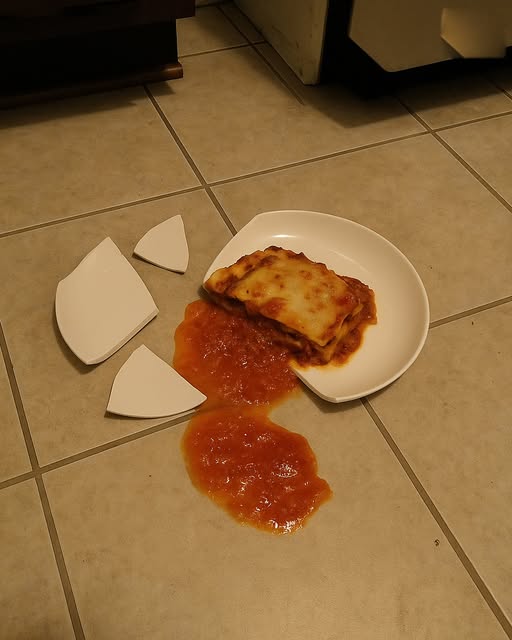My stepdad acted like it was the 1950s, demanding freshly cooked meals every day. When Mom tried to reheat leftovers, he’d toss them aside, insisting a real wife cooked daily. I watched her shrink under his controlling gaze and decided it was time to teach him a lesson in humility.
After Dad passed away six years ago, Mom—Colleen—drifted through life like a ghost. They had been college sweethearts, married for 32 golden years, a love steady enough to need no spotlight. Dad would bring her coffee every morning, kiss her temple before heading to work, and Mom would fold his socks exactly how he liked—paired, rolled, never bunched.
I called her every day from two states away, but no phone call could fill the emptiness at her dinner table.
“I’m fine, sweetie,” she’d say, though I could hear the hollow echo behind the words.
Then came Raymond, a colleague of Mom’s at the community college. An accounting professor with slicked-back hair and overpowering cologne, he started bringing her lunch and fixing things around the house.
I felt relieved someone was checking in when I couldn’t.
“He makes me laugh again, Matty,” Mom said over the phone. “Do you know how long it’s been since I really laughed?”
Raymond moved quickly, and before long, he proposed. The wedding followed almost immediately—a small beach ceremony with twenty guests, sand under our toes. Mom looked radiant in a simple white dress; Raymond genuinely happy. I pushed down my doubts and hugged them both.
“Take care of her,” I whispered to him.
“Always,” he said, patting my back too firmly. “Your mom deserves the world.”
I wanted to trust him. Maybe that’s why I ignored the way he interrupted her at the reception or complained about the cake being too sweet.
“Marriage is about compromise,” Mom said when I asked later. “We’re both adjusting.”
I was glad she had someone steady again, someone who loved her. But I was wrong. So painfully wrong.
Six months later, I arrived at their doorstep with a basket of fresh muffins and enough clothes for a week. Mom hugged me tightly, smaller than I remembered.
“You’ve lost weight,” I said.
She waved it off. “Just trying to keep up with Raymond. He’s very particular about food.”
Over tea in the kitchen, Mom pressed her fingers to her temple.
“Mom, are you alright?”
“Just a headache,” she said, wincing. “I’ve had this cold for a week.”
Her complexion was pale, eyes shadowed. This was more than a cold.
“Have you seen a doctor?” I asked.
“Raymond says it’s allergies. I’ll be fine after resting.” She opened the fridge. “I made lasagna yesterday… your grandma’s recipe.”
Raymond came in, face flushed, not bothering to greet me.
“What’s for dinner?”
“I thought we’d have the leftover lasagna. I don’t have energy for something new tonight.”
His face darkened. “Leftovers? Again?”
“It’s fine, Ray. I just can’t—”
Crash. He swiped the container, pasta and sauce splattering across the floor.
“I’ve told you a hundred times! I DON’T eat the same meal TWICE. Real wives cook fresh food daily!”
Mom knelt, picking up the mess. “I’m sorry… I’ll make something else.”
I sat beside her. “Mom, stop. Let me help.”
Her hands shook. Silence said it all.
“You can help by making something fresh, Matilda,” Raymond said, walking away. “I’ll be in my study.”
That night, I lay awake, haunted by the image of Mom kneeling. Calling the police felt absurd—he’d broken a dish, yes, but worse, he controlled my mother.
At dawn, I found Mom mixing pancake batter.
“Let me cook today,” I said, taking over.
She hesitated. “He likes eggs over medium…”
“Go back to bed. You need rest.”
I pulled out every cookbook and prepared a full breakfast—golden pancakes, perfect eggs, crisp bacon, fruit, coffee.
Raymond came down at seven sharp, raising an eyebrow at the spread.
“Colleen could learn a thing or two from you,” he said, biting into a pancake.
“She’s sick. I’m helping,” I replied, forcing a smile.
He ate, smug, but I had a plan. Over the next four days, I served elaborate meals—Eggs Benedict, hand-rolled sushi, Beef Wellington—each dish from scratch, plated beautifully, every bite praised by him.
Then came the reveal.
“That lamb? Same as two days ago. Potatoes? Leftovers. Carrots? From Monday’s beef. All recycled,” I told him calmly.
Raymond froze. “Disgusting.”
“Yet five minutes ago, you called it the best meal you’ve ever had,” I said.
Mom appeared quietly.
“You served me… leftovers??”
“Leftovers are about planning, efficiency, and not wasting food. My father understood that.”
Raymond turned purple. “How dare you trick me!”
“How dare you treat my mother like a personal chef? Break dishes and demand meals?”
“This is between me and your mother.”
“It became my business when I saw her picking up broken dishes,” I said. “Get your coat.”
“What?”
“I made reservations at Antonio’s. You can heat up food for yourself.”
Mom left; I turned to Raymond.
“My mother spent 32 years with a man who appreciated her. She deserves the same respect now.”
Three months later, Mom called.
“Raymond left a voicemail… begging me to call off the divorce.”
“What did you say?”
“I told him I already had plans… lasagna tonight. Delicious.”
“And Mom? Freedom goes perfectly with lasagna!”
Her laughter rang like wind chimes.
Entitlement eats itself. Raymond thought he deserved service; he forgot love is never owed. Treat kindness like a chore, and eventually, someone serves consequences… with a garnish of get out.
